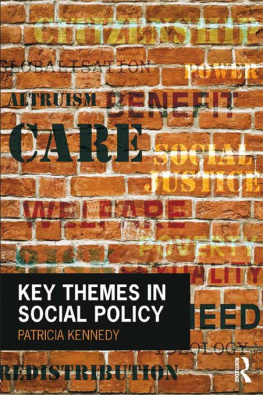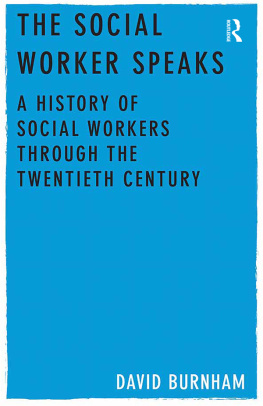African-American Social Workers and Social Policy
First Published by
The Haworth Social Work Practice Press, an imprint of The Haworth Press, Inc., 10 Alice Street, Binghamton, NY 13904-1580.
Transferred to Digital Printing 2009 by Routledge
270 Madison Ave, New York NY 10016
2 Park Square, Milton Park, Abingdon, Oxon, OX14 4RN
2003 by The Haworth Press, Inc. All rights reserved. No part of this work may be reproduced or utilized in any form or by any means, electronic or mechanical, including photocopying, microfilm, and recording, or by any information storage and retrieval system, without permission in writing from the publisher.
Cover design by Brooke Stiles.
Cover logo illustration, African-Family Capital, copyright 2003 by Angela E. Sussewell.
Library of Congress Cataloging-in-Publication Data
African-American social workers and social policy / Tricia Bent-Goodley, editor.
p. cm.
An outgrowth of a June 2000 summit of African American social workers funded by the
Howard University Fund for Academic Excellence.
Includes bibliographical references and index.
ISBN 0-7890-1621-4 (hard : alk. paper)ISBN 0-7890-1622-2 (soft : alk. paper)
1. African American social workers. 2. United StatesSocial policy1993Evaluation.
3. African AmericansSocial conditions21st century. 4. Social work with African Americans.
I. Bent-Goodley, Tricia B.
HV3181 .A374 2003
362.8496073dc21
2002027333
Contents
Tricia B. Bent-Goodley
Wilhelmina A. Leigh
Sandra Edmonds Crewe
Sandra Stukes Chipungu
Sandra Edmonds Crewe
King E. Davis
Shelia L. Clark
Tricia B. Bent-Goodley
Tricia B. Bent-Goodley
Tricia B. Bent-Goodley
Tricia B. Bent-Goodley, PhD, MSW, is the Immediate Past Chair of the NABSW National Public Policy Institute and Immediate Past Chair and Chief Instructor of the NABSW National Academy for African-Centered Social Work. She has organized local communities and grassroots organizations to engage in political networking, local and state advocacy, policy agenda setting, policy forums, and political candidate debates. She has organized national training and education for social workers in social policy, policy analysis, and policy advocacy. Dr. Bent-Goodley has served as a clinician, program planner, supervisor, administrator, and entrepreneur. She has co-edited two forthcoming books with Dr. King E. Davis, titled The Color of Social Policy and Teaching Social Policy in Social Work Education.
Sandra Stukes Chipungu, PhD, is Associate Professor at Howard University School of Social Work. She holds her MSW and PhD from the University of Michigan. Dr. Chipungu is a co-editor of and contributor to Child Welfare: An Africentric Perspective (Rutgers University Press, 1997). She teaches Theories of Administration in the PhD program, and Management in Human Services, Social Welfare Policy, Policy Practice, and Family and Child Welfare I and II in the MSW Program. Her current research focuses on child welfare, foster care, kinship care, evaluation of services to substance-using pregnant and postpartum women, and high-risk youth.
Shelia L. Clark, MSW, is Project Manager for the Partners in Program Planning for Adolescent Health (PIPPAH) initiative at the National Association of Social Workers (NASW) and former Public Policy Associate for the National Black Womens Health Project. In her current position, she focuses on the development and implementation of strategies to promote adolescent health. She currently serves on the Board of Directors for My Sisters Place shelter for battered women and the Reproductive Health Technologies Project. She is also a member of the Black Church Initiative Advisory Committee.
Sandra Edmonds Crewe, PhD, MSW, ACSW, received her BSW and MSW from the National Catholic School of Social Services and a PhD in Social Work from Howard University. Currently, she is an Assistant Professor at the Howard University School of Social Work and teaches research, macro practice, and social gerontology. Dr. Crewe has been the principal investigator of research and evaluations on welfare reform since 1994. In addition, she serves on the professional development faculty of the National Association of Housing and Redevelopment Officials where she leads seminars across the country for resident leaders in public and assisted housing. Dr. Crewe serves on the boards of the National Association of Social Workers (Washington DC Metro Chapter) and the United Communities Against Poverty in Prince Georges County, Maryland.
King E. Davis, PhD, holds the Robert Lee Sutherland Chair in Mental Health and Social Policy at the University of Texas at Austin, School of Social Work. Dr. Davis was a Professor of Public Mental Health Policy and Planning at the Virginia Commonwealth University School of Social Work from 1984 to 2000. From 1998 to 1999, he was the holder of the William and Camille Cosby Chair at Howard Universitys School of Social Work, Washington, DC. Also in 1999, King was appointed to the Libra Chair at the University of Maine, and was a Distinguished Visiting Professor at Washington University in St. Louis. He was awarded the PhD from the Florence G. Heller School of Social Policy and Management at Brandeis University in 1971. His doctoral work focused on the financing of nonprofit organizations.
Dr. Davis is a former Commissioner of the Virginia Department of Mental Health, Mental Retardation, and Substance Abuse Services, appointed by L. Douglas Wilder, Governor of Virginia, and served from 1990 to 1994.
Wilhelmina A. Leigh, PhD, is a Senior Research Associate at the Joint Center for Political and Economic Studies in Washington, DC. She is an economist who has worked in the following areas: health policy, housing policy, labor market issues, and social insurance. Recent publications about social insurance include: Social Security: A Fix for All and the issue brief Social Security Reform: What Proposed Changes Mean for African Americans . Dr. Leigh received her PhD in Economics from Johns Hopkins University and her AB, also in Economics, from Cornell University.
The impetus for this book was listening to the lyrics of Tupac Shakur. He states in one of his songs, Changes, Im tired of being poor and even worse Im black. We gotta start making changes. Learn to see me as your brother instead of two distant strangers. These two lines had a great impact on me but what stood out even more was the eloquence with which he spoke about the pervasiveness of poverty, the viciousness of police brutality, the consequences of feeling powerless to change the environment, and the feeling that he was in this alone. As I listened to other rap artists share their life stories, it became evident that as one examined the lyrics beyond the vulgarity, there was a distinct message concerning social policy. Tupac is one example; however, many of these young people talk about welfare, stereotypes of African Americans, poverty, police corruption, the role of substance abuse, and policies that support these problems. As I sat listening to his words that day, I thought about the young people who I provide services for as a social worker. Their feelings of hopelessness to influence change or policy were clear to me. I thought of previous generations that believed they could create change and did so, in large part, because they believed that they could. What about this generation of young people? Who is their voice? How can we move beyond the language and the violence to hear what is a clear message for action? For me, policy is clearly linked to young people. Thus, I decided to move beyond the rhetoric to find creative ways of influencing social policy and helping others to empower themselves in this arena.









